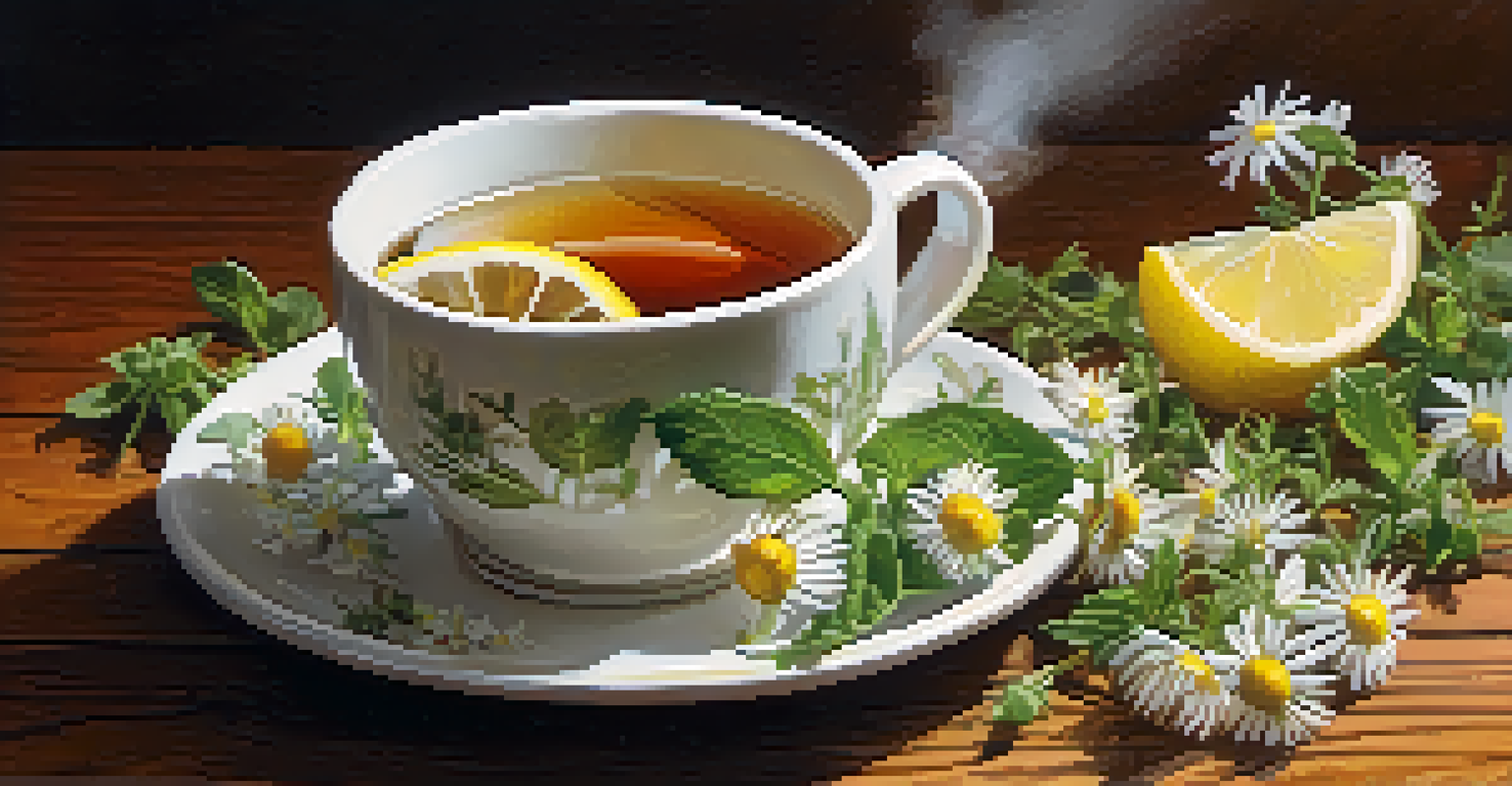Integrating Herbs and Nutrition for Preventive Health

The Role of Nutrition in Preventive Health
Nutrition plays a crucial role in maintaining overall health and preventing diseases. By providing the body with essential vitamins and minerals, a balanced diet helps to strengthen the immune system and promote optimal bodily functions. Think of your body as a car; just as it needs the right fuel to run smoothly, your body requires proper nutrients to stay healthy.
Let food be thy medicine and medicine be thy food.
Preventive health focuses on reducing the risk of chronic illnesses, and nutrition is a key player in this approach. Consuming a diet rich in fruits, vegetables, whole grains, and lean proteins can help ward off conditions like heart disease, diabetes, and obesity. By making mindful dietary choices, you’re essentially investing in your future health.
Moreover, understanding the synergy between different food groups can amplify these benefits. For instance, pairing vitamin C-rich foods like oranges with iron-rich sources like spinach enhances iron absorption, showcasing how nutrition can work together for your well-being.
Understanding the Power of Herbs in Health
Herbs have been used for centuries in various cultures for their medicinal properties. These natural remedies offer a range of health benefits, from anti-inflammatory effects to boosting the immune system. For example, turmeric is celebrated for its powerful anti-inflammatory properties, making it a favorite among those looking to manage chronic pain.

Incorporating herbs into your daily routine doesn't have to be complicated. Simple additions like fresh basil to a salad or a sprinkle of oregano on pasta can elevate your meals while providing health benefits. Think of herbs as the secret ingredients that can transform not just the flavor, but also the nutritional value of your dishes.
Nutrition is Key for Preventive Health
A balanced diet rich in essential nutrients strengthens the immune system and helps prevent chronic diseases.
Additionally, many herbs are rich in antioxidants, which play a vital role in fighting free radicals in the body. This means that including herbs like rosemary or thyme in your meals can help support your body’s natural defense mechanisms, allowing you to feel your best.
Combining Herbs and Nutrition for Optimal Health
When herbs and nutrition come together, the results can be remarkable. This combination can enhance the absorption of nutrients while offering additional health benefits. For instance, adding fresh ginger to a smoothie not only provides a delicious kick but also aids digestion and boosts immunity.
Herbs are the great healers of the world.
You can easily create harmonious meals by incorporating herbs that complement the nutritional value of your main ingredients. For example, pairing garlic, known for its heart health benefits, with leafy greens can create a nutrient powerhouse while adding robust flavor to your dishes.
Moreover, this integration promotes a holistic approach to health. By viewing food as both nourishment and medicine, you empower yourself to take charge of your health, making choices that align with your wellness goals.
Herbal Teas: A Simple Way to Boost Health
Herbal teas offer a convenient and enjoyable way to incorporate herbs into your daily routine. With a plethora of options available, from chamomile for relaxation to peppermint for digestion, there’s a tea for every need. Sipping on a warm cup can also provide a moment of mindfulness in a busy day.
The benefits of herbal teas extend beyond just hydration; they can also deliver concentrated doses of beneficial compounds. For instance, green tea is rich in antioxidants, which can help reduce the risk of chronic diseases. It's like giving your body a gentle cleanse while enjoying a soothing ritual.
Herbs Enhance Health Benefits
Incorporating herbs into meals not only boosts flavor but also offers significant health benefits, including anti-inflammatory properties.
Additionally, making herbal teas at home allows you to experiment with different combinations. Mixing herbs like hibiscus and lemon balm can create a refreshing beverage that not only tastes great but also supports your health goals.
Practical Tips for Integrating Herbs into Your Diet
Integrating herbs into your diet can be both fun and simple. Start by adding fresh herbs to your grocery list, and don’t shy away from experimenting with new flavors. You might discover that you enjoy dill in your yogurt or cilantro in your tacos, broadening your culinary horizons.
Another tip is to grow your own herbs at home. Having a small herb garden on your windowsill or balcony can provide easy access to fresh ingredients. Plus, there's something rewarding about using herbs you've nurtured yourself, making your meals even more special.
Lastly, consider incorporating dried herbs into your cooking. They can be just as beneficial, adding flavor and nutrition to soups, stews, and marinades. Just remember that dried herbs are often more potent, so a little goes a long way!
Recognizing and Avoiding Potential Risks
While herbs can offer numerous health benefits, it’s essential to recognize potential risks. Some herbs may interact with medications or cause allergic reactions in sensitive individuals. Always consult with a healthcare professional before making significant changes to your diet, especially if you have underlying health conditions.
It’s also important to source herbs from reputable suppliers to avoid contaminants. Organic herbs can be a safer choice, ensuring that you’re not ingesting harmful pesticides or chemicals. Think of it as choosing quality ingredients; the better the source, the better the benefits.
Mindful Integration of Herbs
Combining herbs with nutritional ingredients promotes a holistic approach to health and empowers individuals to make healthier dietary choices.
Additionally, moderation is key. While herbs can enhance your health, overconsumption of certain herbs may lead to adverse effects. Balance is the name of the game when it comes to integrating herbs into your nutrition.
Final Thoughts on Herbs and Nutrition for Health
Integrating herbs and nutrition into your daily life can be a delightful journey towards better health. By making conscious choices about what you eat and how you flavor your meals, you empower yourself to take control of your well-being. It’s all about finding the right balance that works for you.
Remember that a holistic approach to health involves not just what you eat, but how you feel and live. Embrace the process, and don’t be afraid to explore different herbs and foods that resonate with your lifestyle and preferences. The journey to preventive health can be enjoyable and rewarding.

Ultimately, the combination of nutrition and herbs is a timeless practice that has stood the test of time. By incorporating these elements into your life, you're not just promoting your health—you're also celebrating the rich flavors and benefits that nature offers.